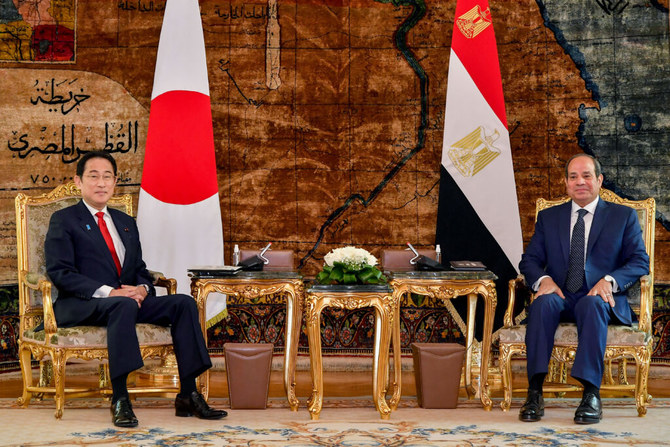For over a century, Egypt and Japan have enjoyed a longstanding friendship beginning in 1922 when Japan became the first Asian country to recognize Egypt’s independence.
Since the mid-1970s, Japan has proactively provided financial support to aid the development of infrastructure in Egypt. Official Development Assistance (ODA) grants began in 1973, followed by yen loans in 1974, and in 1977, the Japan International Cooperation Agency (JICA) established an office in Egypt.
Japan is the world’s third-largest development cooperation partner by ODA value. The cumulative value of Japan’s ODA to Egypt amounts to approximately USD 1.5 billion (EGP 70 billion) in grants, USD 7.2 billion (EGP 335.6 billion) in loans, and USD 900 million (EGP 42 billion) in technical cooperation.
In 2023, Egyptian President Abdelfattah al-Sisi and the Prime Minister of Japan, Fumio Kishida, upgraded their bilateral relations to a “strategic partnership” to advance cooperation on several fronts to achieve regional stability and prosperity.
From trade to education, the two countries enjoy dynamic bilateral relations in different fields.
Education
The Japanese development cooperation in Egypt has achieved tangible results in education. The Egyptian-Japanese University for Science and Technology (E-JUST) which opened in 2009 in Egypt, adopts the Japanese Tokkatsu education model. It introduced engineering education in the Japanese style, incorporating the Japanese education model, Tokkatsu. The university ranked first among Egyptian universities according to the Times Higher Education ranking for 2024 of global universities.
There are 13,000 Egyptian students enrolled in 51 Egyptian-Japanese Schools (EJS), and the Egyptian government is planning to introduce Tokkatsu into all 17,000 public primary schools.
In February 2016, Japan and Egypt initiated the Egypt-Japan Education Partnership (EJEP), with the aim of incorporating different elements of Japan’s educational system into Egyptian schools, to enhance the capabilities of the country’s youth, covering different stages of a student’s pathway: from early childhood to basic, technical, and higher education.
Healthcare
Egypt and Japan’s cooperation extends to healthcare, with JICA and Egypt’s General Authority for Healthcare agreeing to finance the “Japanese Technical Cooperation Project” in the field of Patient-Centered Care toward Universal Health Coverage for the next three years.
This project would focus on Patient-Centered Care (PCC) in 22 health facilities across different health sectors and the governorates included in the first and second phases of the Comprehensive Health Insurance System and Hayya Karima initiative, to achieve enhanced quality in PCC.
Additionally, a new blood production facility in Egypt is being established through a partnership between the Egyptian Authority for Unified Procurement, Medical Supply, and the Management of Medical Technology (U.P.A), Japan Media Systems (JMS) involving technology transfer, project management, and exclusive export to Middle Eastern countries.
According to Bahaa Eddin Zidan, Chairman of U.P.A, “This partnership includes technology transfer, utilization of the JMS brand, full project management, as well as exclusive export to Middle Eastern countries.”
Infrastructure
Japan’s aid to Egypt includes renewable energy projects such as “solar and wind energy, the rehabilitation of old power plants, the development of the electricity distribution sector and energy efficiency, and it provides training courses for Egyptian experts in Japan,” according to Hiroki Ozawa, Representative of the Japan Bank for International Cooperation (JBIC).
Japan was also an active partner in the implementation of the Nexus of Water, Food, and Energy (NWFE) program, which aims to support small farmers and improve rural living standards.
Additionally, the Japan Bank for International Cooperation loaned Egypt USD 192 million (EGP 8.9 million) in 2017 to fund the Ras Ghared Wind Energy Station.
“There is a long history of cooperation with Egypt in financing renewable energy projects,” Ozawa stated.
According to Ozawa, “JBIC has supported Japanese direct investments in Egypt through foreign investment loans, and the Japanese Cooperation Bank welcomes the expansion of projects in Egypt when Japanese expertise is available.”
Investment
In 2021, direct Japanese investments in Egypt increased by 52 percent, with approximately 87 Japanese firms operating in the country. Japanese investments in Egypt surged by 98.7 percent during the fiscal year 2021-2022, reaching USD 73.7 million (EGP 3.4 billion), up from USD 37.1 million (EGP 1.7 billion) the previous year.
In May 2023, Egypt signed its largest-ever investment package with Japan, valued at 100 billion yen (USD 734 million) to support the transport development plan. The agreement will finance the expansion of Cairo’s metro, including a 30-km stretch linking the 6th of October City to the Giza plateau.
This investment is part of a broader commitment, with total Japanese investments in Egypt reaching USD 3 billion (EGP 140 billion) across more than 18 projects under Egypt’s sustainable development goals (SDGs), according to a report by the Ministry of International Cooperation.
Trade
According to data from the Central Agency for Public Mobilization and Statistics, the volume of trade between Egypt and Japan decreased by 26.3 percent to USD 1.1 billion (EGP 41 billion) in 2022.
During this period, Egypt exported goods worth USD 260.8 million to Japan (EGP 12 billion), including fuel, minerals, fruit, iron and steel products, carpets, and animal feed. Conversely, Egypt imported goods worth USD 888.5 million (EGP 41 billion) from Japan, which comprised boilers, machinery, equipment, mechanical tools, cars, tractors, bicycles, and pharmaceutical products.
Culture and Tourism
The tourism industry is one of the largest sources of foreign revenue for Egypt, and Japan is one of the investors in the sector. In cooperation with JICA, the Grand Egyptian Museum (GEM) was built and launched with limited access in February 2023, to develop the tourism industry and create job opportunities in Egypt.
GEM serves as yet another cooperation project between Egypt and Japan, as it has been financed by JICA through loans reaching around USD 800 million.
During a meeting in 2019 between Egyptian President al-Sisi and Mr. Natsuo Yamaguchi, the Leader of Japan’s Komeito Party, the two explored ways to strengthen bilateral relations, especially in tourism. The President highlighted Egypt’s desire to boost Japanese tourism and enhance cultural exchanges between the two countries.







Comments (2)
[…] Read More […]
[…] Read More […]